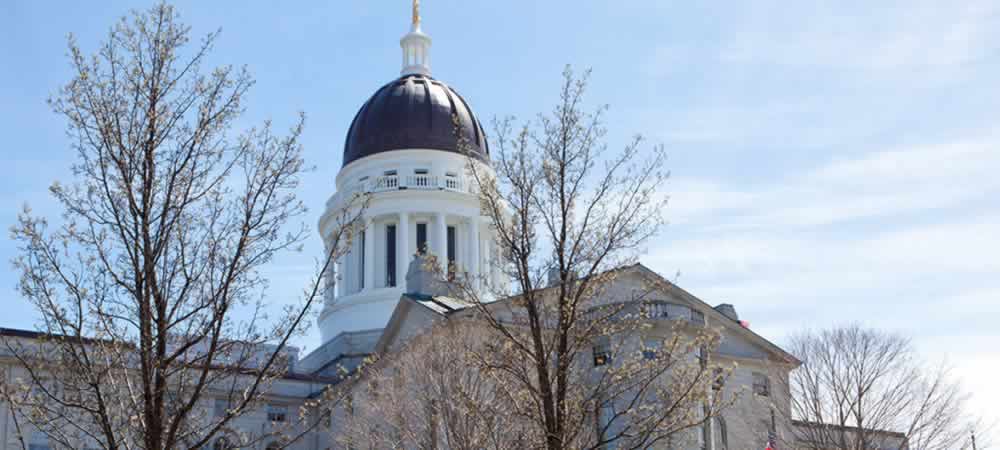- The Maine legislature met Friday with representatives of the state’s gaming industry.
- Several sports wagering bills are on the table, though it is unclear which of these has the edge.
- Maine hopes to legalize area sports betting in time for the start of the NFL season in September.
AUGUSTA, Maine – Despite being the northeasternmost state in the US, Maine is nevertheless centrally located at ground zero for legalized sports betting in the US. Due in large part to New Jersey’s pioneering challenge of the status quo, the East Coast is seeing the most action on the US legalization front so far.
To that end, the state is currently considering five pieces of legislation, any one of which would legalize sports wagering in the state. More importantly, none of these bills has any widespread opposition in the state legislature.
On Friday, representatives from Maine’s two commercial casinos, its tribal bingo hall, its racetrack venues, and off-track betting vendors from the harness racing industry all met in Congress to discuss the future of sports betting with lawmakers.
There was no dissent.
As a result, odds are that Maine will become one of the first of the second wave of states to legalize sports betting in the US.
Of course, even those in the actual gaming industry advocating for these laws are imploring the state to cover all angles before rushing into anything.
Maine wants to offer legal sports betting, but all parties involved want to make sure that the Pine Tree State dots its favorites and crosses its underdogs before moving ahead.
Of key consideration, per Milton Champion of the Maine Gambling Control Unit (which oversees all regulated gaming in the state), is the fact that sports wagering tax revenue is not a cure-all for state budgetary shortfalls.
This is particularly true given the density of gambling options in the Northeast.
“There [are] only so much discretionary funds available. This, in my view, indicates that New England has or is very close to reaching its saturation point. It is essential, however, that we have the ability to offer what the competition offers. And by competition, I am referring to other states.”
Thus, while one of the five Maine bills explicitly bars online mobile sports betting, such a tack seems to be a nonstarter, given the online presences already established in neighboring states.
Casino operator Penn National (which operates the Hollywood Casino Hotel & Raceway Bangor) is similarly given to caution, reminding legislators that legal Maine sports betting is not necessarily an automatic financial windfall.
Jeff Morris, Penn National’s VP of public affairs and government relations, explained the financial reality to legislators, calling the venture a “low-margin” operation.
Successful sportsbooks will typically earn a hold (or “house take”) of between five percent and seven percent. Of this, a base tax rate will yield about one percent of total handle for the government’s coffers.
Of course, the impetus to legalize sports betting is not necessarily predicated on state income from the activity. It is also important to consider the trickle-down effect the pastime will have on area venues and local ancillary economies.
Michael Sweeney, publicity director of Scarborough Downs, believes sports wagering would immediately boost the Downs in its goal to become a mixed-use gambling and entertainment site going forward. Sweeney considers sports betting to be a no-brainer.
“This is an opportunity for industries that are home-grown, locally based, small mom-and-pop businesses to grow and thrive.”
Penn’s Morris agrees, pointing to his brand’s results in other states with legal sports betting. In those markets, Penn National’s venues have seen that sports betting lounges are a major draw.
Indeed, in states with physical land-based sports betting at casino venues, the product offering seems to universally result in increased spending on other casino gaming options. These include increased spending on slot machines, table games, restaurants, and hotel rooms.
It remains unclear which bill or bills have the inside track to passage during the current legislative session. Some of the bills are more conservative than others, and each would legalize the pastime via a different tack.
For example, LD 1571 would give the state’s tribes exclusive rights to offer sports wagering, while LD 1515 would expressly bar online wagering but move sports wagering under the state’s direct purview.
Meanwhile, LD 1348 would legalize land-based and online sports wagering in Maine. This alone seems to give LD 1348 the greatest chance of passage.
If Maine acts quickly enough, area sports bettors should be able to place legal wagers in time to take the Pats to repeat at roughly +700 odds.
Advertising Disclosure
In order to provide you with the best independent sports betting news and content LegalSportsBetting.com may receive a commission from partners when you make a purchase through a link on our site.
News tags: Maine | Maine sports betting | ME LD 1348 | ME LD 1571
Benjamin has always had a passion for writing, graduating with his B.A. in English from Florida A & M University. While you might find him writing poetry in his spare time, he is also an experienced technical sports writer with a keen interest in eSports. A true tech-nerd at heart, Benjamin combines his writing skills and tech-savvy to produce highly engaging content.


 College Football Betting
College Football Betting Best Online Sports Betting
Best Online Sports Betting Best Legal NFL Betting
Best Legal NFL Betting States With Legal Sports Betting
States With Legal Sports Betting Sports Betting Events
Sports Betting Events




